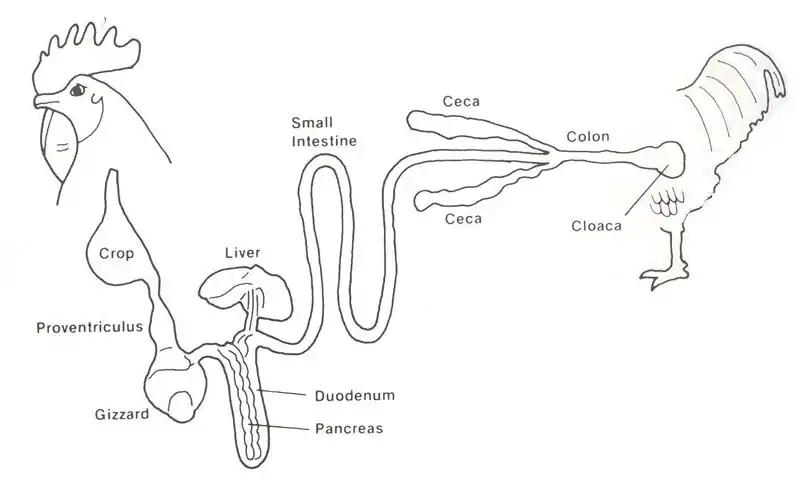Proventriculus
The proventriculus is part of the digestive system of birds.[1] An analogous organ exists in invertebrates and insects.
Birds
The proventriculus is a standard part of avian anatomy, and is a rod shaped organ, located between the esophagus and the gizzard of most birds.[2] It is generally a glandular part of the stomach that may store and/or commence digestion of food before it progresses to the gizzard.[3] The primary function of the proventriculus is to secrete hydrochloric acid and pepsinogen into the digestive compartments that will churn the ingested material through muscular mechanisms.[4] Pepsinogen produces pepsin, which breaks the peptide bonds found in peptides and proteins.[5] The muscle contractions of the gizzard push material back into the proventriculus, which then contracts to mix materials between the stomach compartments. This transfer of digested material can occur up to 4 times per minute, and the compartments can hold the stomach contents for thirty minutes to an hour.[4]
The Encarta (2007) holds that the proventriculus is:
The first part of a bird's stomach, where digestive enzymes are mixed with food before it goes to the gizzard. It is analogous to the gizzard in insects and crustaceans.[1]
Thomas Cecere (College of Veterinary Medicine of VirginiaTech)[6] discusses the proventriculus of the avian stomach and opines that:
The proventriculus is the glandular portion of the avian compound stomach, and a rather peculiar organ it is. There's nothing like it in mammals.[7]

Culinary use
Chicken proventriculus is eaten as street food in the Philippines. It is dipped in flour and deep fried until golden brown. It is served best with spiced vinegar and is often sold in a small kiosk. This dish is called proben.
See also
Notes
- Encarta World English Dictionary [North American Edition] (2007). Proventriculus. Source: "Archived copy". Archived from the original on 2008-01-07. Retrieved 2007-12-18.CS1 maint: archived copy as title (link) (accessed: December 18, 2007)
- Zaher, Mostafa (2012). "Anatomical, histological and histochemical adaptations of the avian alimentary canal to their food habits: I-Coturnix coturnix". Life Science Journal. 9: 252–275.
- Source: "Archived copy". Archived from the original on 2007-12-27. Retrieved 2007-12-18.CS1 maint: archived copy as title (link) (accessed: December 18, 2007)
- Svihus, Birger (2014). "Function of the Digestive System". The Journal of Applied Poultry Research. 23 (2): 306–314. doi:10.3382/japr.2014-00937.
- Moran, Edwin (2016). "Gastric digestion of protein through pancreozyme action optimizes intestinal forms for absorption, mucin formation and villus integrity". Animal Feed Science and Technology. 221: 384–303. doi:10.1016/j.anifeedsci.2016.05.015.
- http://www.vetmed.vt.edu/Education/Curriculum/VM8054/HP/profbio.htm%5B%5D
- Caceci, Thomas (undated). Proventriculus. Source: "Archived copy". Archived from the original on 2007-12-10. Retrieved 2007-12-18.CS1 maint: archived copy as title (link) (accessed: December 18, 2007)